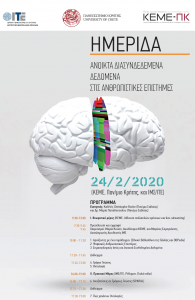Previous Seminars


1) Digital Humanities & Cultural Heritage Course
. 2 & 3 July 2020: fully booked
. 7 & 8 July 2020: fully booked
. 3 & 4 August 2020
. 3 & 4 September 2020
A 3rd session is scheduled for August 3 and 4. This two-day session will be done remotely (via zoom).
A 4th session is scheduled for September 3 and 4. This two-day session will be done remotely (via zoom).
This doctoral seminar is an introduction to Digital Humanities defined as the application of methods and tools from Information and Communication Technologies to areas of Arts, Humanities and Social Sciences. Rather than a simple application of computer tools, Digital Humanities offer a multidisciplinary perspective that has recently led to rethinking certain practices, e.g., in the acquisition and representation of knowledge in the field, and opened up new perspectives for the disciplines concerned.
In the framework of this training, the focus will be on the digital representation of cultural objects in the form of Linked and Open Data accessible by means of standards of the Semantic Web.
To validate the acquired knowledge, the seminar includes a full day of hands-on practice on how to query and to structure data in cultural heritage collections.
In the framework of this training, the focus will be on the digital representation of cultural objects in the form of Linked and Open Data accessible by means of standards of the Semantic Web.
To validate the acquired knowledge, the seminar includes a full day of hands-on practice on how to query and to structure data in cultural heritage collections.
Nanjing University of Aeronautics and Astronautics (China)
Summer School: 19-30 August 2019
Summer School: 19-30 August 2019
Aims:
The aim of this course is to teach the concepts, technologies and techniques underlying the building of Ontologies and Terminologies for the Semantic Web with special application to the knowledge areas of Digital Humanities and Cultural Heritage.
The aim of this course is to teach the concepts, technologies and techniques underlying the building of Ontologies and Terminologies for the Semantic Web with special application to the knowledge areas of Digital Humanities and Cultural Heritage.
Learning Outcomes:
At the end of the course the student should be able to:
1. Understand and discuss fundamental concepts, advantages and limits of Ontologies and Terminologies for the Semantic Web in Digital Humanities and Cultural Heritage
2. Understand and use ontologies and terminologies in the context of Digital Humanities and Cultural Heritage
3. Understand the relationship between Ontology, Terminology and Ontoterminology.
4. Understand complicated argumentative texts on the topics discussed during the course.
5. Identify the principal ideas, arguments, etc. in such texts and to separate them from side issues.
6. Reflect critically about the concept of ontological modelling, and the state of the art of research at the intersections of Ontology, Terminology and Digital Humanities.
7. Explain the possibilities of digital and computational tools for ontological modelling in the areas of Humanities and Cultural Heritage.
8. Perform hands-on modelling with Cmap Tools (Florida Institute for Human and Machine Cognition, USA), Protégé (Stanford University, USA) and Tedi (Univ. Savoie Mont-Blanc, France).
9. Present their own model of ontologies-terminologies-ontoterminologies on knowledge areas related to the topics of the course.
At the end of the course the student should be able to:
1. Understand and discuss fundamental concepts, advantages and limits of Ontologies and Terminologies for the Semantic Web in Digital Humanities and Cultural Heritage
2. Understand and use ontologies and terminologies in the context of Digital Humanities and Cultural Heritage
3. Understand the relationship between Ontology, Terminology and Ontoterminology.
4. Understand complicated argumentative texts on the topics discussed during the course.
5. Identify the principal ideas, arguments, etc. in such texts and to separate them from side issues.
6. Reflect critically about the concept of ontological modelling, and the state of the art of research at the intersections of Ontology, Terminology and Digital Humanities.
7. Explain the possibilities of digital and computational tools for ontological modelling in the areas of Humanities and Cultural Heritage.
8. Perform hands-on modelling with Cmap Tools (Florida Institute for Human and Machine Cognition, USA), Protégé (Stanford University, USA) and Tedi (Univ. Savoie Mont-Blanc, France).
9. Present their own model of ontologies-terminologies-ontoterminologies on knowledge areas related to the topics of the course.
Organized by Dr 刘翚(LIU Hui)
3) Digital Humanities & Linked and Open Data Workshop
University of Crete – Foundation for Research and Technology IMS (Greece)
24 February 2019
24 February 2019
 ΣΤΟΧΟΙ:
ΣΤΟΧΟΙ:
- Γνωριμία με τον Σημασιολογικό ιστό και ορισμένα από τα βασικά του λεξιλόγια και πρότυπα (W3C vocabularies & standards).
- Παρουσίαση του προτύπου CIDOC-CRM του Διεθνούς Συμβουλίου Μουσείων (ICOM)
- Εκπαίδευση στην χρήση του προτύπου SPARQL, δηλαδή της γλώσσας αναζήτησης που χρησιμοποιείται στον Σημασιολογικό Ιστό, ώστε οι εκπαιδευόμενοι να μπορούν να ανασύρουν δεδομένα που αφορούν στις Ανθρωπιστικές Επιστήμες τα οποία έχουν δομηθεί σύμφωνα με τις αρχές των Ανοικτών Διασυνδεδεμένων Δεδομένων.
Organized by Dr Melina Tamiolaki
